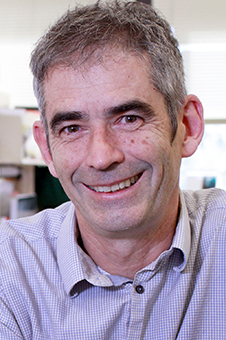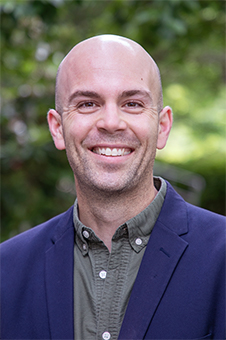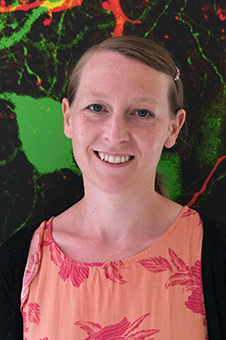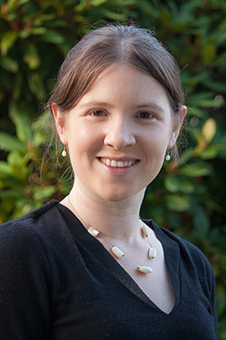Ten out of the 22 successful Health Research Council (HRC) grants received by the University of Otago were for recipients based in the School of Biomedical Sciences (BMS).
This means that of the $34 million in funding received by the University, almost $24 million ($23,966,548) will be allocated directly to the BMS.
Congratulations to Dr Rosemary Brown, Professor Catherine Day, Dr Jemma Geoghegan, Professor David Grattan, Professor Parry Guilford, Associate Professor Keith Ireton, Professor Roslyn Kemp, Dr Sharon Ladyman, Professor Alexander McLellan and Dr Matthew McNeil for being the successful recipients.
The funding being provided to Professor David Grattan, Dr Rosemary Brown and Dr Sharon Ladyman is all in the field of maternal health and pregnancy.
“It is great to see a significant investment in this under-researched area with three projects having been funded in the same year,” Professor Grattan says.
“This area of health research is increasingly coming into the spotlight which is really encouraging, and it is both exciting and meaningful to be able to contribute to this.”
This is a notable success for the School, with the Deputy Vice-Chancellor (Research and Enterprise) Professor Richard Blaikie pleased with the funding the University has received.
“The treatments and interventions that come from this research will also reduce the costs of care and significantly reduce inequities in our health system in many cases,” Professor Blaikie says.
“We are extremely grateful that the Health Research Council has again been able to support some of our best and brightest research teams in their endeavours in this year's round.”
HRC 2022 grant recipients
Associate Professor Keith Ireton – Department of Microbiology and Immunology

Associate Professor Ireton.
Associate Professor Ireton received a grant of $1,199,984 to cover three years of research on the role of polarized exocytosis in the infection of host cells by pathogenic E. coli.
“The pathogen enterohaemorrhagic E. coli [EHEC] is responsible for hemolytic uremic syndrome in New Zealand and other high-income countries, whereas the related pathogen enteropathogenic E. coli [EPEC] is a major cause of infantile diarrhoea in developing nations,” Associate Professor Ireton says.
“These bacterial pathogens stimulate the formation of protrusive structures called 'pedestals' that promote the growth of bacteria on the surface of the human intestinal epithelium.”
Associate Professor Ireton and his team hypothesise that pedestal formation by EHEC and EPEC bacteria involves the bacterial exploitation of a human protein complex called the 'exocyst'.
Exploitation of the exocyst by EHEC and EPEC stimulates a process called 'polarized exocytosis' which expands the surface of the human intestinal epithelium, allowing bacteria to more efficiently colonize the intestine.
Using this funding, he plans to apply a combination of genetic, biochemical and microscopy-based approaches to determine if the formation of pedestals involves the bacterial subversion of the exocyst, as well as identifying the microbial factors that elicit exocytosis.
He anticipates that these studies will contribute to a better understanding of how EHEC and EPEC bacteria infect the intestine to cause disease.
Knowledge gained from this work may eventually inform the development of novel therapeutics to treat EHEC and EHEC infections.
Professor Catherine Day – Department of Biochemistry
 Professor Catherine Day.
Professor Catherine Day.
For the next three years, Professor Catherine Day will be using the $1,199,533 she receives in funding to investigate WNT signalling as a matter of degradation
In healthy animals, cellular processes precisely determine the number and type of cells. One pathway, referred to as WNT signalling, is required for embryonic development and maintaining adult stem cells.
The abnormal activation of WNT signalling frequently leads to cancer, with mutations commonly occurring in the core pathway regulators.
“Two related enzymes, called ZNRF3 and RNF43, regulate WNT signalling by determining the abundance of WNT receptors on cell membranes,” Professor Day says.
“This is achieved by the attachment of a tag, called ubiquitin, which signals for the destruction of the receptors and so our goal is to identify new interventions for cancer by elucidating how ZNRF3 and RNF43 function.
“We will use biochemical approaches to reveal how these enzymes attach ubiquitin to WNT receptors and how they are regulated; work which will reveal important new knowledge about WNT signalling and should provide new targets for drug development.”
Professor Day is “thrilled” to have received this funding because it will allow her to continue supporting key members of her research team and will support new collaboration with the Horsfield lab in the Pathology Department.
“It is also great to see the HRC continue to invest in fundamental research that may have unexpected outcomes.”
Professor David Grattan – Department of Anatomy

Professor David Grattan.
Professor David Grattan will use his three-year-long HRC funding of $1,199,969 to investigate hormone-induced adaptations in respiratory function during pregnancy.
“We are interested in how pregnancy hormones change a mother's physiology,” Professor Grattan says.
“In this case, we are specifically interested in how the neural control of breathing is changed in a mother during pregnancy.”
He explains that this was a new collaboration set up between a research fellow in his group, Teodora Georgescu, and with the help of Professor Julian Paton in Auckland, a world expert in the brain control of respiratory function.
Dr Georgescu discovered that some of the key brain structures that normally control breathing have receptors for the pregnancy hormone, prolactin and so they plan to use this funding to understand how prolactin action might regulate the function of these neurons in pregnancy.
They are “excited about this research opportunity” because it will provide a fundamental understanding of the biological changes that occur in a mother during pregnancy, which is necessary to help people understand what happens when things might go wrong, thereby supporting the treatment of complications that might arise during pregnancy.
“Additionally, this will provide a relatively stable and long-term salary to an early-career researcher whilst developing a new national collaboration that will expand the horizons of both groups; a very exciting endeavour.”
Professor Parry Guilford – Department of Biochemistry

Professor Parry Guilford.
Professor Parry Guilford will be investigating a single-cell transcriptomic approach to gastric cancer heterogeneity using his $1,199,413 over a period of three years.
Professor Guilford explains that solid tumours are made up of millions of cells, but that those cells are not all the same and that this cellular diversity can be a great challenge when it comes to administering treatments because different cell types will respond differently to the drugs administered.
As a result, it is very common for cancers to grow back after treatment because the drug has only killed a sub-population of cells in the tumour.
“The last few years has seen the emergence of a method called single cell sequencing which allows researchers to see the heterogeneity [the diversity of cells] within a tumour and better select drug combinations to kill all of the tumours sub-populations of cells,” Professor Guilford says.
“We plan to use this funding to do single cell sequencing to determine the heterogeneity in early-stage stomach cancers.
“That way more appropriate drugs can be selected to combat these tumours and prevent advanced cancer from developing, particularly in people who have an inherited risk of developing stomach cancer because this risk is currently being managed by removing the entire stomach which leads to other life-long side effects.
“We are confident that drug choices informed by single cell sequencing will allow these high-risk families to delay surgery or avoid it altogether.”
Professor Roslyn Kemp – Department of Microbiology and Immunology

Professor Roslyn Kemp.
For the next three years, Professor Roslyn Kemp will be using her HRC funding of $1,190,405 to research immune cells, bacteria and epithelium in Crohn's disease patients.
Inflammatory Bowel Diseases (IBDs) are chronic inflammatory illnesses of the gut that affect around 40,000 New Zealanders with symptoms including diarrhoea, pain and malnutrition, leaving those with the disease having a significantly impaired quality of life.
There is no cure for most IBDs, and it is troublesome to treat due to its complexity, with varying treatments working to various degrees for different people.
“Our research uses a new model to study disease; we create “mini-guts” from cells collected from the gut of IBD patients during colonoscopy and culture these with immune cells from the same patient and with gut bacteria,” Professor Kemp says.
“This is to better understand how IBDs are caused and identify ways to create new treatments that could benefit each individual patient.”
She is glad to have received this funding as it will allow her team to collect data from patients over a longer period of time so they can more thoroughly investigate the effects of current treatments on each individual patient.
“It also means that two Early Career Researchers, Andy Highton and Safina Gadoeck, both University of Otago graduates, can be employed to complete the work and to establish themselves as independent researchers in New Zealand; a very exciting step forward for all involved.”
Professor Alexander McLellan – Department of Microbiology and Immunology

Professor Alexander McLellan.
Professor Alexander McLellan will use his $1,199,975 grant over the next three years to research a dual safety system to promote CAR T cell activation and migration.
“Chimeric antigen receptor (CAR) T cell therapy involves the treatment of cancer with genetically engineered immune cells,” Professor Alexander says.
“However successful CAR T cell therapy of solid cancers is limited by the migration and activation of CAR T cells at the tumour site.”
His team plans to use this funding to implement a dual-safety system to improve CAR T cell function and to localise T cell cytokines directly to the tumour site to enhance cell migration and activation.
These original approaches will greatly improve the utility of CAR T cells for the treatment of solid cancers, “a meaningful and exciting research endeavour for the team”.
Dr Matthew McNeil – Department of Microbiology and Immunology

Dr Matthew McNeil.
Photo: Sharron Bennett.
Funded by an HRC grant totalling $1,199,544, Dr Matthew McNeil will look at targeting metabolic dysregulation to eradicate drug resistant Mycobacterium tuberculosis over the next three years.
“Antimicrobial resistance is a global health crisis,” Dr McNeil says.
“Drug-resistant strains of Mycobacterium tuberculosis, the causative agent of tuberculosis, are extremely difficult to treat, with long treatment regimens of nine to 20 months and low cure rates of two to 50 per cent.”
Antibiotic resistance in M. tuberculosis is predominantly a result of mutations in antibiotic targets that have crucial roles cellular physiology. Here we hypothesize that these mutations also have unintended consequences that lead to metabolic dysregulation in drug resistant strains.
Using a combination of research avenues, Dr McNeil and his team plan to reveal and then exploit this metabolic dysregulation. This work will identify an entirely new suite of treatment strategies that ultimately increase antibiotic efficacy, reduce treatment times and prevent the emergence of drug resistance.
Dr Sharon Ladyman – Department of Physiology

Dr Sharon Ladyman.
Dr Sharon Ladyman says that expecting mothers need to increase food intake to meet the energy demands of their growing fetus and store that energy as fat in preparation for lactation.
The concept of “eating for two” is commonly accepted, but there is actually little understanding of what drives this increased appetite.
It requires adaptive changes in the mother's brain to overcome the normal regulatory systems that control appetite and such changes can make women more susceptible to excessive weight gain during pregnancy which can have longterm health risks for mother and baby.
Dr Ladyman plans to use her HRC funding totalling $1,197,681 over the next four years to investigate the activity of AgRP neurons, which drive food intake, during pregnancy and lactation.
“The AgRP neurons in the hypothalamus region of the brain are recognised as the critical neurons driving food intake and so we propose state-of-the-art techniques to monitor this neuronal activity throughout pregnancy and lactation,” Dr Ladyman says.
“Our aim is to understand how this important appetite-regulating neuron population adapts to increase food intake during pregnancy.
“Pregnancy represents an understudied challenge for metabolic health, yet one that offers a unique window of opportunity where appropriate intervention could have lifelong health benefits for both mother and child.”
Dr Ladyman believes that a better understanding of how the body adapts to pregnancy will provide a platform for translational work to more effectively design interventions that can target the biological adaptations during pregnancy.
Dr Jemma Geoghegan – Department of Microbiology and Immunology

Dr Jemma Geoghegan.
When New Zealand closed its borders to control COVID‑19, many of the other respiratory viruses that ordinarily circulate annually were also eliminated.
As a result, New Zealand has become an immunologically-naïve population and will likely see larger, unseasonal and more severe outbreaks in future, like the 2021 Respiratory syncytial virus (RSV) outbreak following borders being opened briefly to Australia, and the huge numbers of Influenza virus currently circulating.
Dr Jemma Geoghegan plans to use her $1,196,858 in HRC funding to set up a research project where, over the next three years, she will generate whole viral genomes from patient samples diagnosed with respiratory infections such as RSV and influenza viruses.
“The purpose would be to extend our genomics-informed surveillance to undiagnosed respiratory infections,” Dr Geoghegan says.
“Our world-leading team of infectious disease experts will collaborate to enhance pathogen surveillance and diagnostics in New Zealand and build a genomic pathogen framework, augmenting our ability to respond to future disease outbreaks.”
She is “very excited” to be working with her team on this exciting research project, a collaboration that began during the COVID‑19 pandemic when they set out to sequence genomes from COVID‑19 cases.
“It has been a hugely successful collaboration and I can't wait to get started.”
Dr Rosemary Brown – Department of Physiology

Dr Rosemary Brown.
Dr Rosemary Brown will use her three-year HRC grant of $1,199,908 to investigate the impact of obesity on maternal neural circuitry.
Her research group has previously undertaken research to show that the pituitary hormone prolactin plays a critical role in promoting care-giving behaviour in mothers, though the underlying mechanism behind this is still unknown.
This brought Dr Brown to the aim of this project; determining how prolactin alters the activity of neurons that drive mood and behavioural changes in mothers.
“We will utilise recent technical developments in neuroscience to enable real-time detection of how the activity of prolactin-sensitive neurons changes during interactions with offspring,” Dr Brown says.
This research is important because the interactions between a mother and her infant are critically important in a child's development.
“Maternal obesity is associated with an increased risk in developing a range of pregnancy complications, including postpartum mood disorders, and is also one of the primary causes of reduced prolactin signalling during pregnancy. We will investigate how obesity affects the activity of key populations of prolactin-sensitive neurons that regulate a mother's behaviour during pregnancy and lactation.”
With mental health issues affecting 15 per cent of new mothers in New Zealand, there is a real need to understand how the brain regulates mood and mother-infant interactions during pregnancy and lactation.
“We are delighted to have received this funding and that the importance of research into pregnancy and postpartum health is being recognised,” Dr Brown says.
“Our long-term aim is to contribute to the development of novel and effective strategies to assist women that suffer from postpartum mood disorders.
“The first few years of an infant's life are critical in a child's development and so that early postpartum period represents a unique window of opportunity to influence long-term health of an individual.”
Kōrero by School of Biomedical Sciences Communications Adviser, Kelsey Schutte.Otago Bulletin: Otago researchers receive significant HRC funding